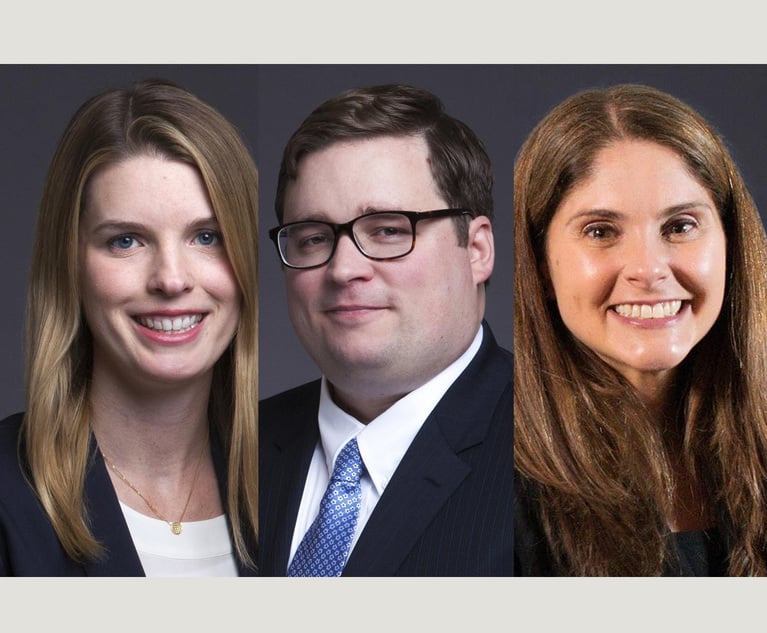Arbitration Award Upheld in Consumer Case Against Invention Promoter
U.S. District Chief Judge Joy Flowers Conti of the Western District of Pennsylvania on Tuesday affirmed an arbitration award in favor of plaintiff Betty Frison and against Davison Design & Development.
December 06, 2018 at 02:22 PM
3 minute read
 Photo: Shutterstock
Photo: Shutterstock
A federal court has upheld an arbitration award, including attorney fees, against an invention promotion company sued for violating the American Inventors Protection Act.
U.S. District Chief Judge Joy Flowers Conti of the Western District of Pennsylvania on Tuesday affirmed an arbitration award in favor of plaintiff Betty Frison and against Davison Design & Development.
However, the court also upheld the dismissal of Frison's fraudulent misrepresentation claim.
Frison took Davison to arbitration after claiming the company had violated the AIPA when addressing the likelihood of success of Frison's invention by making “material false and fraudulent statements or representations and omissions of material fact … and by their failure to make required disclosures,” according to Conti's opinion.
The arbitrator found in favor of Frison, awarding her roughly $13,000—twice the amount of what she paid to Davison for invention assistance—and $10,000 in attorney fees. Davison asked the district court to upend the award, arguing “the arbitrator manifestly disregarded the law and exceeded his powers when entering the award in Frison's favor and made a material miscalculation of damages owed pursuant to the award.”
However, Conti shot down that argument, as well as Davison's others. First, she examined the contract at issue in the case and the warranty disclaimers. The warranty said in part that the company does not make representations about the probability of success of an invention.
“The arbitrator did not specifically explain why he determined that the warranty disclaimer in the IPRPA was unenforceable; nevertheless, in rendering the award, he stressed the AIPA's role in consumer protection and found that Davison had made false representations to Frison violating the act by implication,” Conti said.
She added, “Even if boilerplate disclaimers like those included by Davison in the pre-development agreement and [integrated product rendering presentation agreement] were lawful and enforceable under the AIPA, Davison still cannot vacate the award on the basis of manifest disregard for the law.”
Davison also contested the amount of damages and attorney fees awarded.
“By increasing the damages by a factor of two—per the discretion afforded under Section 297(b)(2) to increase damages by up to a factor of three where there is evidence of intentional misrepresentation—the arbitrator makes clear that he considered the conduct by Davison to be intentional,” Conti said. “As the court already observed, 'if a court can find any line of argument that is legally plausible and supports the award then it must be confirmed.'”
Davison is represented by Anna Shabalov of K&L Gates, and Frison is represented by Daniel W. Ernsberger of Behrend & Ernsberger. Neither responded to calls seeking comment.
This content has been archived. It is available through our partners, LexisNexis® and Bloomberg Law.
To view this content, please continue to their sites.
Not a Lexis Subscriber?
Subscribe Now
Not a Bloomberg Law Subscriber?
Subscribe Now
NOT FOR REPRINT
© 2025 ALM Global, LLC, All Rights Reserved. Request academic re-use from www.copyright.com. All other uses, submit a request to [email protected]. For more information visit Asset & Logo Licensing.
You Might Like
View All
Lawsuit Against Major Food Brands Could Be Sign of Emerging Litigation Over Processed Foods
3 minute read

People in the News—Jan. 23, 2025—Marshall Dennehey, Duane Morris, Hangley Aronchick
3 minute read
Plaintiff Argues Jury's $22M Punitive Damages Finding Undermines J&J's Talc Trial Win
4 minute readTrending Stories
- 1We the People?
- 2New York-Based Skadden Team Joins White & Case Group in Mexico City for Citigroup Demerger
- 3No Two Wildfires Alike: Lawyers Take Different Legal Strategies in California
- 4Poop-Themed Dog Toy OK as Parody, but Still Tarnished Jack Daniel’s Brand, Court Says
- 5Meet the New President of NY's Association of Trial Court Jurists
Who Got The Work
J. Brugh Lower of Gibbons has entered an appearance for industrial equipment supplier Devco Corporation in a pending trademark infringement lawsuit. The suit, accusing the defendant of selling knock-off Graco products, was filed Dec. 18 in New Jersey District Court by Rivkin Radler on behalf of Graco Inc. and Graco Minnesota. The case, assigned to U.S. District Judge Zahid N. Quraishi, is 3:24-cv-11294, Graco Inc. et al v. Devco Corporation.
Who Got The Work
Rebecca Maller-Stein and Kent A. Yalowitz of Arnold & Porter Kaye Scholer have entered their appearances for Hanaco Venture Capital and its executives, Lior Prosor and David Frankel, in a pending securities lawsuit. The action, filed on Dec. 24 in New York Southern District Court by Zell, Aron & Co. on behalf of Goldeneye Advisors, accuses the defendants of negligently and fraudulently managing the plaintiff's $1 million investment. The case, assigned to U.S. District Judge Vernon S. Broderick, is 1:24-cv-09918, Goldeneye Advisors, LLC v. Hanaco Venture Capital, Ltd. et al.
Who Got The Work
Attorneys from A&O Shearman has stepped in as defense counsel for Toronto-Dominion Bank and other defendants in a pending securities class action. The suit, filed Dec. 11 in New York Southern District Court by Bleichmar Fonti & Auld, accuses the defendants of concealing the bank's 'pervasive' deficiencies in regards to its compliance with the Bank Secrecy Act and the quality of its anti-money laundering controls. The case, assigned to U.S. District Judge Arun Subramanian, is 1:24-cv-09445, Gonzalez v. The Toronto-Dominion Bank et al.
Who Got The Work
Crown Castle International, a Pennsylvania company providing shared communications infrastructure, has turned to Luke D. Wolf of Gordon Rees Scully Mansukhani to fend off a pending breach-of-contract lawsuit. The court action, filed Nov. 25 in Michigan Eastern District Court by Hooper Hathaway PC on behalf of The Town Residences LLC, accuses Crown Castle of failing to transfer approximately $30,000 in utility payments from T-Mobile in breach of a roof-top lease and assignment agreement. The case, assigned to U.S. District Judge Susan K. Declercq, is 2:24-cv-13131, The Town Residences LLC v. T-Mobile US, Inc. et al.
Who Got The Work
Wilfred P. Coronato and Daniel M. Schwartz of McCarter & English have stepped in as defense counsel to Electrolux Home Products Inc. in a pending product liability lawsuit. The court action, filed Nov. 26 in New York Eastern District Court by Poulos Lopiccolo PC and Nagel Rice LLP on behalf of David Stern, alleges that the defendant's refrigerators’ drawers and shelving repeatedly break and fall apart within months after purchase. The case, assigned to U.S. District Judge Joan M. Azrack, is 2:24-cv-08204, Stern v. Electrolux Home Products, Inc.
Featured Firms
Law Offices of Gary Martin Hays & Associates, P.C.
(470) 294-1674
Law Offices of Mark E. Salomone
(857) 444-6468
Smith & Hassler
(713) 739-1250





